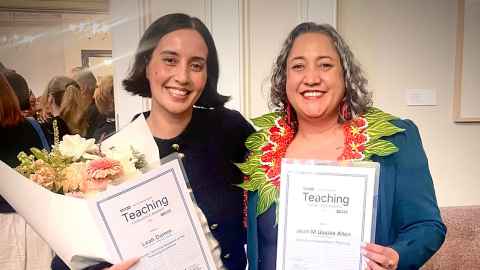Teaching Excellence Awards for Pacific women academics
4 September 2025
Dr Jean M. Uasike Allen and Leah Damm have been honoured for outstanding contributions as educators.

Pacific academics have been recognised at the Faculty of Arts and Education Teaching Excellence Awards ceremony, for their unwavering commitment to education as a transformative force in the lives of learners.
Senior lecturer Dr Jean M. Uasike Allen (Makaunga and Kolovai/Tongatapu, Tefisi/Vava'u – Tonga, and European) received the Early Career Teaching Excellence Award for her innovative, culturally grounded pedagogy (method and practice of teaching).
Leah Damm (Matavera, Rarotonga/Cook Islands Māori) Pacific Studies – Te Wānanga o Waipapa, received the Graduate Teaching Assistant Teaching Excellence Award. Her teaching and research on the digital vā and Pacific women’s engagement with social media reflect a deep commitment to student-centred learning.
Allen’s teaching philosophy was shaped early in life. Her Tongan father saw education as a pathway to opportunity, and her mother served as both a primary school teacher and principal. Allen witnessed first hand the power of education to uplift families and communities.
“The idea of transformation is one that has stuck with me,” says Allen. “It was embedded in me since childhood.”
Her journey as an educator began with a Bachelor of Education in 2003, followed by teaching roles in primary schools across Auckland. She later transitioned into tertiary education, teaching at Auckland University of Technology and Waipapa Taumata Rau, University of Auckland. Over the years, Allen has taught students aged five to 65, from a wide range of cultural and socio-economic backgrounds.
A pivotal moment in her career came while working in a low socio-economic school, where she gained deeper insight into the challenges families face—and their shared aspirations for their children’s success.
“Building relationships with students and their families remains central to my teaching philosophy,” she explains. “Education isn’t just about transferring knowledge. It’s about linking curriculum content to students’ lived experiences, and holding an innate belief that all students can achieve.”
Allen cites the film The Freedom Writers as a source of early inspiration. It later reinforced her belief that high expectations and genuine care can lead to profound transformation in the classroom.
Her approach is grounded in empathy, cultural responsiveness, and a deep respect for the diverse journeys of her students. Whether teaching young children or mature learners, Allen’s impact is felt far beyond the classroom walls.
Education isn’t just about transferring knowledge. It’s about linking curriculum content to students’ lived experiences, and holding an innate belief that all students can achieve.
A third-year doctoral candidate in sociology at the University, Leah Damm jokes that she holds a qualification in “being very nosy.” Yet her curiosity has led to a powerful and timely thesis exploring how Pacific women engage with social media - particularly Instagram - and what it means to be a Pacific woman in today’s digital age.
She was excited to be acknowledged for her teaching, as she juggles the demands of being an educator, doctoral student and a mother to her daughter.
“It’s a great honour to be acknowledged, especially at this early stage of my career. I’m blessed to have an incredibly supportive department and network of mentors, who have helped nurture my teaching practice throughout my research journey.”
Her research, titled Gendering the Digital Vā, focuses on Pacific women aged 18 to 44 across Aotearoa, examining how they navigate online spaces with cultural consciousness, emotional intelligence and digital fluency.
Damm’s work extends into the digital vā, a term that anchors Pacific ways of being and relating within online platforms.
“Instagram is a fascinating space,” she says. “It’s not just brown people online - it’s much more involved than that. These platforms are politically and economically loaded, and at best, indifferent to Pacific realities.”
Challenging the assumption that young people are passive digital users, she reveals their nuanced understanding of online safety, identity, and well-being and how they consciously negotiate boundaries in digital environments.
Damm advocates for a holistic approach to digital engagement, one that recognises the emotional and cultural significance of online spaces for Pacific communities.